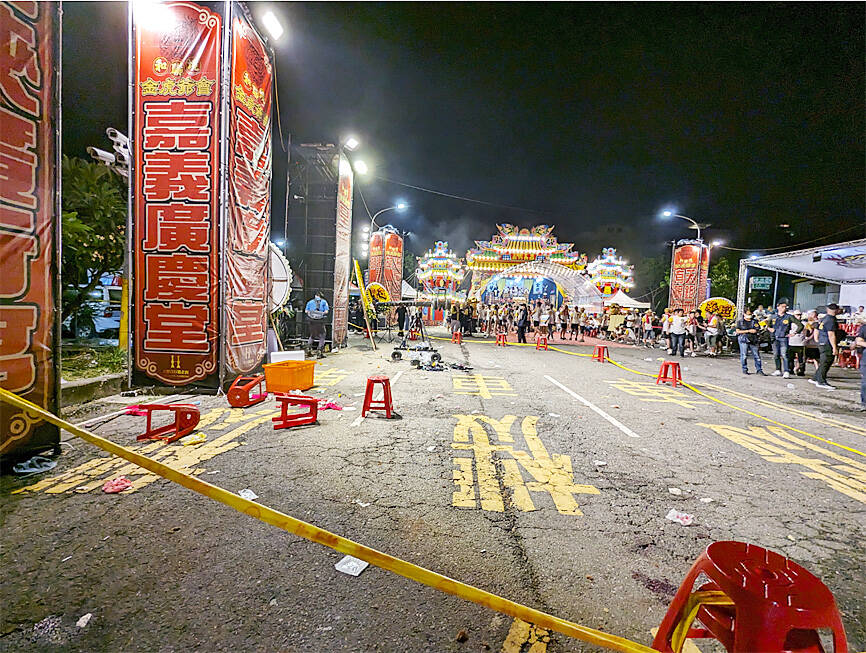Gas appeared to be the cause of a blast at a Chiayi City temple that injured 28 people, the Chiayi Fire Bureau said yesterday, ruling out the possibility that explosives were involved.
At about 9:56pm on Saturday, an explosion went off in front of a stage set up at the intersection of Jinshan Road and Yongle Street for a festival honoring the Tiger God.
As of 9am yesterday, 28 people had been reported injured, four of whom had relatively serious injuries, the Chiayi City Government said.

Photo: Wang Shan-yan, Taipei Times
Seven were still in hospital receiving treatment for glass lacerations or burns, it added.
Initial investigations have ruled out explosives as the cause of the blast, which exhibited the characteristics of a gas explosion, bureau Director Su Yao-hsing (蘇耀星) said.
Further investigation is required to determine the exact cause, he added.
Forensic investigators found trash bags and gravel at the site of the explosion, Chiayi First Precinct deputy chief Yin Chia-hung (殷嘉宏) said, adding that a team has been set up to investigate the cause.
Eyewitnesses said the blast originated from a trash can, which did not have any firecrackers or other explosives inside, the event organizer said.
Representatives from the city yesterday morning visited the injured in hospital to provide assistance, Chiayi Mayor Huang Min-hui (黃敏惠) said, adding that the official cause of the incident would be announced once the investigation is finished.

SECURITY: As China is ‘reshaping’ Hong Kong’s population, Taiwan must raise the eligibility threshold for applications from Hong Kongers, Chiu Chui-cheng said When Hong Kong and Macau citizens apply for residency in Taiwan, it would be under a new category that includes a “national security observation period,” Mainland Affairs Council (MAC) Minister Chiu Chui-cheng (邱垂正) said yesterday. President William Lai (賴清德) on March 13 announced 17 strategies to counter China’s aggression toward Taiwan, including incorporating national security considerations into the review process for residency applications from Hong Kong and Macau citizens. The situation in Hong Kong is constantly changing, Chiu said to media yesterday on the sidelines of the Taipei Technology Run hosted by the Taipei Neihu Technology Park Development Association. With

A US Marine Corps regiment equipped with Naval Strike Missiles (NSM) is set to participate in the upcoming Balikatan 25 exercise in the Luzon Strait, marking the system’s first-ever deployment in the Philippines. US and Philippine officials have separately confirmed that the Navy Marine Expeditionary Ship Interdiction System (NMESIS) — the mobile launch platform for the Naval Strike Missile — would take part in the joint exercise. The missiles are being deployed to “a strategic first island chain chokepoint” in the waters between Taiwan proper and the Philippines, US-based Naval News reported. “The Luzon Strait and Bashi Channel represent a critical access

‘FORM OF PROTEST’: The German Institute Taipei said it was ‘shocked’ to see Nazi symbolism used in connection with political aims as it condemned the incident Sung Chien-liang (宋建樑), who led efforts to recall Democratic Progressive Party (DPP) Legislator Lee Kun-cheng (李坤城), was released on bail of NT$80,000 yesterday amid an outcry over a Nazi armband he wore to questioning the night before. Sung arrived at the New Taipei City District Prosecutors’ Office for questioning in a recall petition forgery case on Tuesday night wearing a red armband bearing a swastika, carrying a copy of Adolf Hitler’s Mein Kampf and giving a Nazi salute. Sung left the building at 1:15am without the armband and apparently covering the book with a coat. This is a serious international scandal and Chinese

COUNTERINTELLIGENCE TRAINING: The ministry said 87.5 percent of the apprehended Chinese agents were reported by service members they tried to lure into becoming spies Taiwanese organized crime, illegal money lenders, temples and civic groups are complicit in Beijing’s infiltration of the armed forces, the Ministry of National Defense (MND) said in a report yesterday. Retired service members who had been turned to Beijing’s cause mainly relied on those channels to infiltrate the Taiwanese military, according to the report to be submitted to lawmakers ahead of tomorrow’s hearing on Chinese espionage in the military. Chinese intelligence typically used blackmail, Internet-based communications, bribery or debts to loan sharks to leverage active service personnel to do its bidding, it said. China’s main goals are to collect intelligence, and develop a